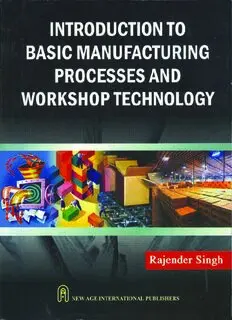Table Of ContentTHIS PAGE IS
BLANK
Copyright © 2006 New Age International (P) Ltd., Publishers
Published by New Age International (P) Ltd., Publishers
All rights reserved.
No part of this ebook may be reproduced in any form, by photostat, microfilm,
xerography, or any other means, or incorporated into any information retrieval
system, electronic or mechanical, without the written permission of the publisher.
All inquiries should be emailed to rights@newagepublishers.com
ISBN (10) : 81-224-2316-7
ISBN (13) : 978-81-224-2316-7
PUBLISHING FOR ONE WORLD
NEW AGE INTERNATIONAL (P) LIMITED, PUBLISHERS
4835/24, Ansari Road, Daryaganj, New Delhi - 110002
Visit us at www.newagepublishers.com
Dedicated
to
My Father Late Shri Sada Ram
THIS PAGE IS
BLANK
PREFACE
Manufacturing and workshop practices have become important in the industrial envi-
ronment to produce products for the service of mankind. The knowledge of manufacturing
practices is highly essential for all engineers and technocrats for familiarizing themselves
with modern concepts of manufacturing technologies. The basic need is to provide theoreti-
cal and practical knowledge of manufacturing processes and workshop technology to all the
engineering students. Therefore, an attempt has been made through this book to present
both the theoretical and practical knowledge of these subjects. Considering the general
needs of engineering students in the country and the fact that they hardly get any exposure
to hand tools, equipments, machines and manufacturing setups, a basic course in manufac-
turing science remains a core subject for all the branches of engineering. This book covers
most of the syllabus of manufacturing processes/technology, workshop technology and work-
shop practices for engineering diploma and degree classes prescribed by different universi-
ties and state technical boards. While preparing the manuscript of this book, the examina-
tion requirements of the engineering students have also been kept in mind. The book is
written in very simple language so that even an average student can easily grasp the subject
matter. Some comparisons have been given in tabular form and the stress has been given
on figures for better understanding of tools, equipments, machines and manufacturing set-
ups used in various manufacturing shops. The contents include exposure to bench work and
fitting, smithy and forging, sheet metal work, wood and wood working, casting, welding and
machine shop practices. At the end of each chapter, a number of questions have been
provided for testing the student’s understanding about the concept of the subject. The whole
text has been organized in twenty six chapters.
The first chapter presents the brief introduction of the subject with modern concepts
of manufacturing technology needed for the competitive industrial environment. Chapter 2
provides the necessary details of plant and shop layouts. General industrial safety measures
to be followed in various manufacturing shops are described in detail in chapter 3.
Chapters 4–8 provide necessary details regarding fundamentals of ferrous materials,
non-ferrous materials, melting furnaces, properties and testing of engineering materials and
heat treatment of metals and alloys.
Chapters 9–13 describe various tools, equipments and processes used in various shops
such as carpentry, pattern making, mold and core making, foundry shop. Special casting
methods and casting defects are also explained at length.
Chapters 14–16 provide basic knowledge of mechanical working of metals. Fundamental
concepts related to forging work and other mechanical working processes (hot and cold
working) have been discussed at length with neat sketches.
(viii)
Chapter 17 provides necessary details of various welding and allied joining processes
such as gas welding, arc welding, resistance welding, solid state welding, thermochemical
welding, brazing and soldering.
Chapters 18–19 describe sheet metal and fitting work in detail. Various kinds of hand
tools and equipments used in sheet metal and fitting shops have been described using neat
sketches.
Chapters 20–24 provide construction and operational details of various machine tools
namely lathe, drilling machine, shaper, planer, slotter, and milling machine with the help
of neat diagrams.
Chapter 25 deals with technique of manufacturing of products with powder metallurgy.
The last chapter of the book discusses the basic concepts of quality control and inspection
techniques used in manufacturing industries.
The author strongly believes that the book would serve not only as a text book for the
students of engineering curriculum but would also provide reference material to engineers
working in manufacturing industries.
Although every care has been taken to check misprints and mistakes, yet it is difficult
to claim perfection. Any errors, omissions and suggestions for improvement of this volume
will be thankfully acknowledged and included in the next edition.
RAJENDER SINGH
ACKNOWLEDGEMENT
On completion of the book ‘Introduction to Basic Manufacturing
Processes and Workshop Technology’, foremost I acknowledge the grace
of God; and the blessing of my father late Sh. Sada Ram, my mother Smt.
Sona Devi, my respected teacher Prof. G.S. Sekhon and my elders. I wish to
acknowledge my sincere thanks to Sh. Shailendra Kumar, lecturer in Hindu
College of Engineering, Sonepat, Haryana for assisting me at various stages
during preparation of the manuscript. I also acknowledge the students and
colleagues whose association has given me the experience of teaching this
and related subjects and hence the manuscript of this book could be possible.
I am very happy to record my sense of gratitude to my wife Promilla, daugh-
ter Swati and son Ravi Kant for their patience, understanding and moral
support without which it would have not been possible for me to complete
this book.
Finally, I am thankful to our publisher, New Age International (P) Ltd.
Publishers for bringing out the book in a record time and such a nice format.
RAJENDER SINGH

